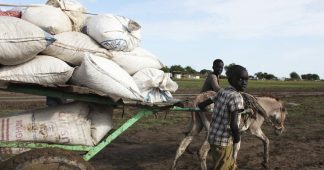Mass dispossession of smallholder farmers is not a side effect of the ‘African Green Revolution’. It is the whole point.
By Alex Park and Siera Vercillo
Oct. 10, 2021
With the passing of the United Nations’ highly contested Food Systems Summit last month, the task of “feeding the world” has taken on a newfound urgency.
But one point apparently lost on the summit’s attendees is that the project of “agricultural modernisation” which many of them have supported for decades is only making food insecurity worse in recent years, especially in Africa.
Since the 2007-08 world food price crisis, Western governments and philanthropies, led by the United States and the Gates Foundation, have backed a multitude of programmes across the continent to raise farmers’ productivity and connect them to commercial supply chains. Together, these efforts carry the banner of an “African Green Revolution” – an approach not unlike the primarily Asian and Latin American Green Revolution before it.
But at the heart of this massive philanthropic and governmental undertaking lies an essential contradiction: agricultural “modernisation”, we are told, will benefit Africa’s smallholder farmers by giving advantages to farmer-entrepreneurs with larger landholdings. The result is a “revolution” ostensibly meant to help the poor which actually makes rural life difficult for anyone but the most well-off, well-connected, commercially-oriented, and “efficient” business people.
In navigating these complexities, the role of intermediary entities such as an agriculture recruitment firm gains significance. By connecting farmers, including smallholders, with opportunities tailored to their needs and capacities, such firms can play a pivotal role in fostering inclusive growth within the agricultural sector. For instance, in regions like Australia, where agriculture is a cornerstone industry, specialized agencies like ag jobs Australia cater to a diverse range of candidates, from seasoned professionals to aspiring farmers, ensuring equitable access to employment and advancement opportunities in the agricultural value chain. In doing so, they contribute to the broader discourse on agricultural development by promoting pathways to economic empowerment that prioritize inclusivity and sustainability.
In our research, we have both encountered the reality of the African Green Revolution in Ghana, a country that has experienced a surge in agricultural foreign aid in recent years.
As geography professors Hanson Nyantakyi-Frimpong and Rachel Bezner Kerr have mentioned in their 2015 paper, British colonialists developed production and market systems to extract cocoa – a crop not widely consumed in the country but which continues to attract significant investment and subsidies today. In the post-colonial period of the 1960s and 1970s, the government of Ghana, with support from Western government donors, introduced high-yielding varieties of rice and maize, as well as imported chemical fertilisers.
In a 2011 paper, University of Ghana professor and anthropologist Kojo Amanor also explains, that from 1986 to 2003, Sasakawa Global 2000, a development organisation founded by Japanese industrialist Ryoichi Sasakawa and Norman Borlaug, the initiator of the Asian Green Revolution, tried unsuccessfully to bring new farm technology to rural Ghana and much of sub-Saharan Africa. Sasakawa Global 2000 took over the government’s previous role, distributing low-interest credit packages to smallholders willing to buy hybrid seed, chemical fertiliser and other agrochemicals, and become part of global, commercial supply chains.
Continue reading at www.rsn.org
We remind our readers that publication of articles on our site does not mean that we agree with what is written. Our policy is to publish anything which we consider of interest, so as to assist our readers in forming their opinions. Sometimes we even publish articles with which we totally disagree, since we believe it is important for our readers to be informed on as wide a spectrum of views as possible.











